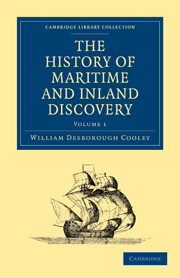CHAP. III - TRAVELS OF IBN BATUTA CONTINUED
Published online by Cambridge University Press: 05 July 2011
Summary
After a stay of one month and six days in Constantinople, Ibn Batuta returned to Astrachan, where he remained a little time. Leaving Tatary he now pursued his journey into Khavaresm or Chorasm, through a desert ill supplied with herbage or water. But in this part of his narrative there is such a deficiency of detail, either from the haste of the traveller himself, or the fault of his abbreviator, that no interest can be found in tracing his route, except that which is excited by his indefatigable love of locomotion. Chorasm was a populous city, and appeared to him to be the largest in the possession of the Turks. The people were polite and hospitable. One singular custom, however, prevailed among them; those who absented themselves from public worship were flogged by the priest in presence of the congregation, and fined, moreover, in a sum of five dinars. A whip was hung up in every mosque for the punishment of the neglectful. This custom is still retained in Bokhara, where the people are driven to worship with the whip. The most numerous sect in Chorasm were the Schismatics, or those who rejected predestination; but they did not care to spread abroad their heresy.
From Chorasm, Batuta went to Bokhara, which he found but imperfectly restored from the desolation poured upon it by Jengis Khan. He proceeded next to Samarcand, a rich and beautiful city, sanctified, in the devout theologian's eyes, by the tombs of numerous saints which it contained. Crossing the Gihon, he entered Khorasan, and travelling a day and night, through a desert without a habitation, arrived at Balkh, once a great city, but now in ruins.
- Type
- Chapter
- Information
- The History of Maritime and Inland Discovery , pp. 190 - 208Publisher: Cambridge University PressPrint publication year: 2010First published in: 1830



